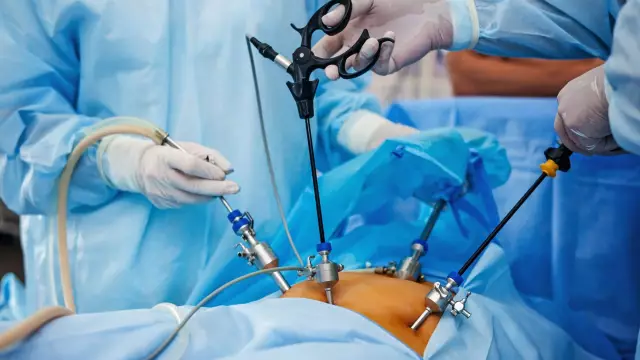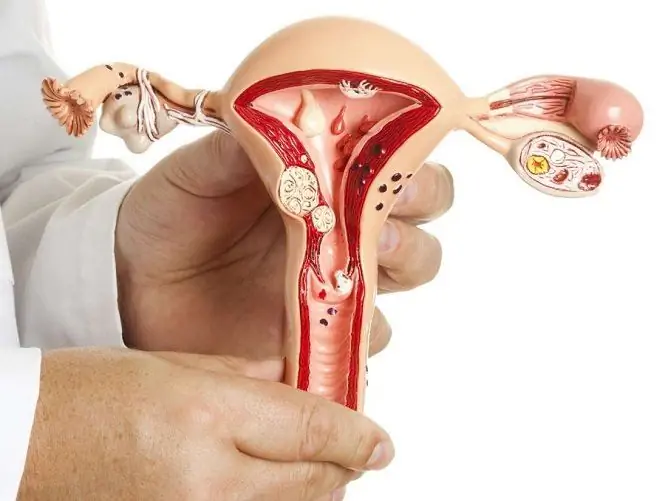- Author Rachel Wainwright wainwright@abchealthonline.com.
- Public 2023-12-15 07:39.
- Last modified 2025-11-02 20:14.
Removal of the uterus: consequences

Any woman experiences a psychological shock upon hearing from a doctor that she will have to remove the uterus - the consequences of this operation scare her. You can often hear the opinion that after the removal of the uterus, a woman ceases to be a full-fledged woman. She ceases to enjoy sex life, and her body begins to age rapidly, resulting in many diseases. But in fact, this is all a common myth. Believe that a happy and normal life is possible without a uterus.
Consequences of removing the uterus: early postoperative period
The rehabilitation period after a hysterectomy (removal of the uterus) lasts about one and a half months, of course, provided that the operation took place without any complications. According to reviews, the consequences of removing the uterus in the first few days after surgery are:
- Pain in the area of the postoperative wound. They usually last for 1 - 2 days and are well controlled by injections of conventional painkillers (baralgin, analgin, ketanal).
- Bleeding. Normally, the postoperative wound should not bleed. But spotting from the vagina in small quantities can continue for a month after surgery. But if you have severe bleeding or its intensity increases over time, then you should urgently consult your doctor.
You should also immediately consult with the surgeon if any of the following symptoms appear:
- Increased body temperature;
- Swelling and redness of the skin in the lower extremities;
- A sudden sharp loss of strength or an attack of severe general weakness;
- Acute urinary retention.
After hysterectomy, the postoperative period is much easier for those women who went to the operation with the correct psychological attitude, and also followed all the instructions of the attending physician.
Removal of the uterus: implications for sexual activity
During the first two months after surgery, a woman should completely abstain from sexual intercourse. In the future, there are absolutely no obstacles to this. After a hysterectomy, women retain all sensitive nerve endings located both on the external genitalia and in the vagina. Therefore, they can, as before, experience an orgasm and enjoy sexual pleasure.
Problems in sex life after removal of the uterus mainly occur only in women with a labile psyche. They are so afraid of the consequences of removing the uterus in case of fibroids or some other disease that they are unable to think about anything else. And as a result of this, they cannot achieve the sexual arousal necessary for orgasm. So their problems are psychological rather than physical. In this case, seeking help from a competent psychologist helps. But you yourself must understand that the operation has not fundamentally changed anything in your life, except for one thing - the possibility of having children.
Scientists in the UK have conducted a survey of women who underwent hysterectomy. According to their reviews, many of them simply did not feel the consequences of removing the uterus. Their lives continued in their usual way. 94% of the operated women emphasized that they were wrongly afraid of the upcoming operation and the possible negative consequences associated with it.
Removal of the uterus with fibroids: consequences
Many women are so scared by the myths about the danger of removing the uterus that they prefer to continue living with myoma, refusing to undergo surgical treatment. Yes, indeed, in some cases of fibroids, conservative therapy may be successful. Unfortunately, this is not always the case. Refusing an operation, a woman risks not only her health, but also her life.
As we already wrote above, the removal of the uterus with myoma does not bear negative consequences.

But the operation relieves a woman from frequent and profuse uterine bleeding, to stop which sometimes it is necessary to resort to an operation to scrap the uterine cavity. The iron deficiency anemia that develops as a result of blood loss requires serious and long-term treatment, and sometimes blood transfusion (blood transfusion). In addition, there is always a fairly high risk of malignant degeneration of fibroids with the development of cancer of the uterine body. So the consequences of removing the uterus with fibroids for a woman's life are only positive.
Removal of the uterus and ovaries: consequences
In some diseases, gynecologists are forced to resort to removing not only the uterus, but also the ovaries. Such operations inflict a fairly strong blow on a woman's body.
The ovaries produce female sex hormones. When they are removed, artificial menopause and menopause occur. To prevent this, a woman is usually prescribed hormone replacement therapy with synthetic analogues of estrogen and progesterone, which should be carried out for a long time.
The negative consequences of removing the uterus and ovaries are most often:
- Sex drive disorders;
- Increased risk of developing cardiovascular disease;
- Depression;
- Increased fatigue;
- Decrease in bone mineral density up to the development of osteoporosis and associated pathological fractures.
But operations to remove the uterus and ovaries are often the only hope for many women for a long and happy life, for example, with cancer of the uterus and / or ovaries. And the development of negative consequences after them allows you to prevent timely prescribed and correctly selected hormone replacement therapy.
YouTube video related to the article:
Found a mistake in the text? Select it and press Ctrl + Enter.






